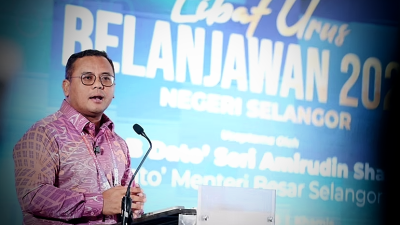
By Boo Cheng Hau
Lately there have been heated debates within and without Pakatan Harapan over whether a counter-coup should be initiated. Strategists planning the move have proposed that PH woo back PPBM reps in order to recoup the lost "public mandate". They argue that the country's economy will be a whole lot worse, and the "people will suffer even more" if they do not recapture Putrajaya soonest.
Sounds very convincing indeed!
Let's put aside the question of political ethics. Take the case of Johor for instance, someone has proposed to persuade some "marginalized" PPBM assemblymen to return to the PH fold so that PH can be brought back to power in the state.
What attractive perks can opposition PH offer to these assemblymen to lure them back to their camp? Talking political philosophies with PPBM is most likely a wasted effort, while buying them over will invariably leave an unethical precedent. I believe PH does not have the willpower nor the resources to do so, and can therefore achieve this only through offering cabinet posts in exchange for their allegiance.
With the three PH parties visibly unable to get a simple majority, the "returning" PPBM reps will unfailingly demand a menteri besar post or exploit PH as a tool to advance their personal gains, in their negotiations, so that PPBM reps in the minority now get to dictate state policies once again.
Even if PH eventually manages to recapture the state administration, by allowing a handful of PPBM reps to dictate state policies, PH will not be able to introduce policies that will truly benefit the people and will in turn be dumped by the voters come the next election.
Meanwhile, non-Malay politicians very often overlook the towering role of the Malay Rulers. As many as 90% of Malays feel that the Malay Rulers constitute an indispensable symbol of their ethnicity, and are playing a pivotal role in many a political crisis. This explains why the Johor Sultan has ordered all quarters to stop the power-grabbing game or he will dissolve the state assembly to pave way for a snap state election. The Malay leaders of PH parties have expressed their willingness to abide by the royal decree, while those who have proposed to entice PPBM assemblymen back to PH remain largely muted.
PKR's MP for Pasir Gudang Hassan Abdul Karim has reminded all that this country is a constitutional monarchy and the Malay Rulers do not have unilateral constitutional power to dissolve the state assembly.
While Hassan's categorical political stand and principle rightly deserve our respect, his foresighted thinking is nonetheless a rarity in the Malay community.
We can debate the Sultan's open warning from the constitutional perspectives, but this actually underscores the conventional attitude of the Malay Rulers.
From the constitutional point of view, even if the Parliament or a state assembly has adopted a no-confidence motion against the prime minister or MB, the Constitution allows the prime minister or MB to advise the King or state ruler to dissolve the Parliament or state assembly to pave way for a snap election.
Is PH adequately prepared in the event of a snap election? Or did it design its cacophonous power-grabbing game just to satiate the fantasies of some die-hard fans? Does it have sufficient confidence to win back the power after the snap election?
According to the convention of the Westminster-style constitutional monarchy, if a sitting government loses a no-confidence vote, the prime minister will propose to the ruler to dissolve the Parliament for a snap election. New generation PH "strategists" naively believe if the Dewan Rakyat eventually passes the no-confidence motion against PM Muhyiddin, the Yang di-Pertuan Agong will unhesitantly instruct PH to form a new government. These people seem to have scant knowledge of the country's constitution and Westminster-style parliamentary democracy.
They seem to have overlooked the reality that there is a much bigger probability for the incumbent prime minster to advise the King to dissolve the Parliament for a snap election.
A no-confidence motion was passed in the British parliament against James Callaghan's minority Labor government in 1979 on the back of economic decline and nationwide strike. As a result, Callaghan resigned and advised the Queen to dissolve the Parliament to pave way for a snap election which saw Conservative Party's Margaret Thatcher rise to power.
Those new generation "strategists" who claim they know the Malay culture like the back of their hands have failed to visualize the lofty status of the Malay Rulers in the Malay society as well as their roles accorded by the country's Constitution.
They believe without Mahathir and PPBM, they would not have won the 14th general election. These befuddled young people appear to have inherited a deep-rooted "siege mentality" from some kind of dark forces. In reality, their conservative mindset has been an extension of the "Malay first" advocacy of Umno and PPBM.
New generation PH leaders have never gone through the Ops Lalang during Mahathir's time in the 1980s, when opposition leaders were arrested and put behind bars without trial under the notorious Internal Security Act, and when judicial independence was seriously menaced.
Having savored the sweet taste of power for 22 months, these people understandably subscribe to the self-deprecating conviction that without the political clout of racist PPBM and Tun Mahathir, PH would never get to rule, and hence the emergence of the new generation political conservatism discourse.
The new generation political discourse needs to move with the times to pioneer contemporary democratic reforms and pluralistic cause before the nation can safely lay its hopes on it.
On the contrary, new generation politicians think they must look to the old forces to ascend the power hierarchy and avidly support outmoded mindset and blindly gratify those in power in a bid to advance their own political careers. In so doing, such conservatively minded new generation politicians will see their impetus for reform depleted.
Perhaps these people need to experience a political calamity before they can clearly see the objective of their struggle. That will then signal a new beginning for a wave of reformation.
(Boo Cheng Hau is former assemblyman for Skudai.)
ADVERTISEMENT
ADVERTISEMENT


































